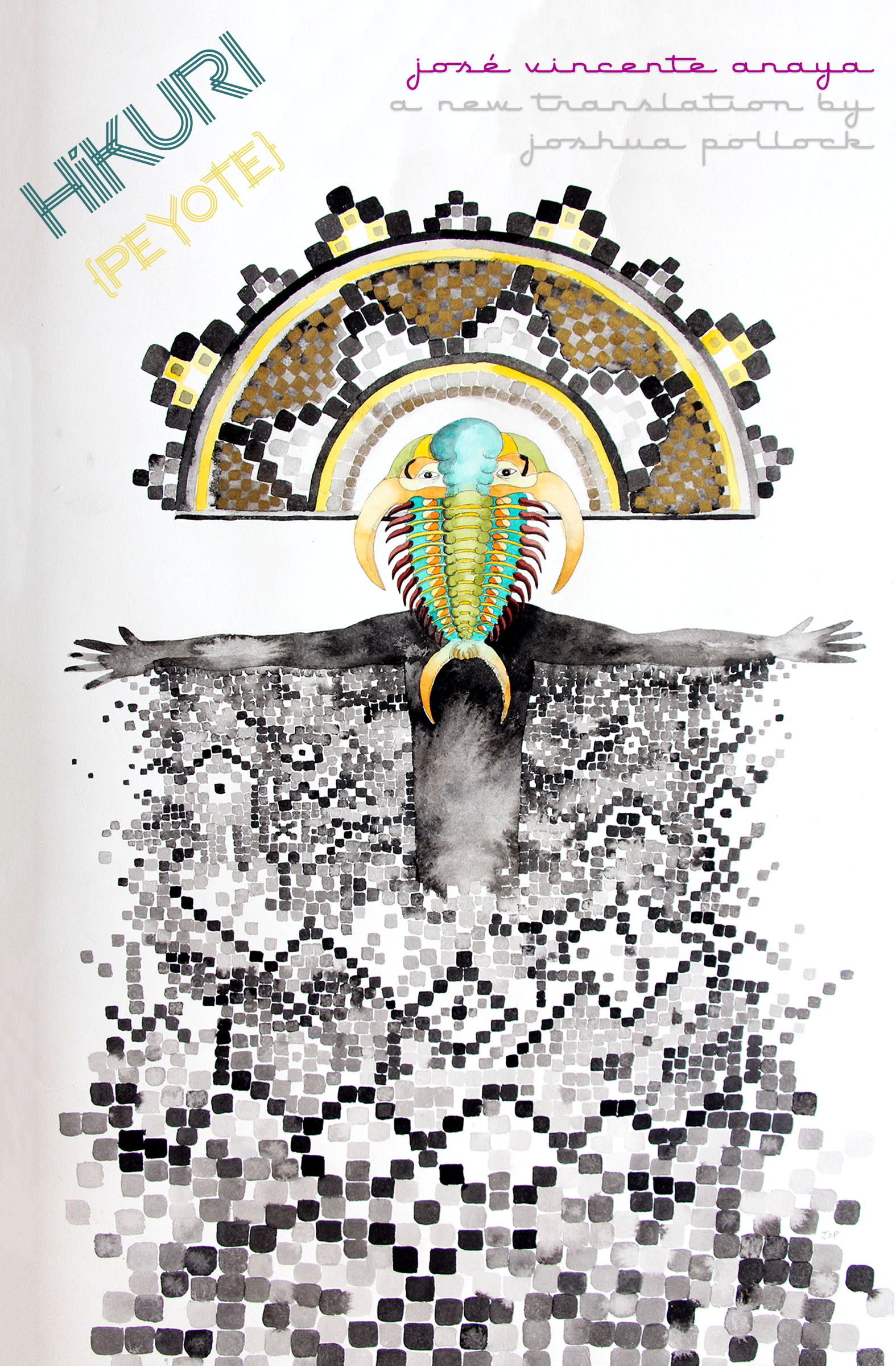
Humans
- José Vicente Anaya (author)
- Joshua Pollock (translator)
- Jimena Schlepfer (artist)
ISBN
978-1-946031-70-9
LCCN
2019956460
Page count
146
Keywords
Poetry, Visual Poetry, Symbol, Symbols, Mexico, Infrarealism, Drugs, Psychedelics, Indigenous, Culture, Ecopoetry, Environment, Ecosystem, Nature, Colonialism, Ethnopoetry, Ethnopoetic, Translation, Translingual
Publication date
2020
Language(s)
Spanish, English
Publication media type
Print Document
Translation
Dual-Language
Publication series
Glossarium: Unsilenced Texts
Híkuri (Peyote)
“Híkuri (Peyote)” is Mexican Infrarealist José Vicente Anaya’s cult-classic poem. Influenced by his participation in a series of peyote ceremonies in his native Chihuahua, Anaya charts a transformative journey inwards, towards a psychedelic convergence of inside/outside, male/female, past/present, self/other. Incorporating Rarámuri language and traversing territory associated with ecopoetics, ethnopoetics, modernism, and infrarealism, Híkuri (Peyote) presents a utopian alternative to EuroAmerican colonial modernity—a reclamation of autonomy and poetic nomadism. [This edition is a dual-language facing-page translation, with commentary from both Anaya and translator Joshua Pollock.]
“José Vicente Anaya’s long, visionary poem ‘Híkuri (Peyote)’ is a countercultural classic of Mexican literature. But it is not only that: it is a mapping of the borderlands of self, a meditation on the ethnopoetic and its limits, and a celebration of the chant as eco-indigenous form that challenges the colonial politics of the lettered city. While Anaya is often mentioned for his transnational involvement with alternative poetry movements (Beat poetry, Mexican Infrarealism), ‘Híkuri (Peyote)’ is its own translingual poetics of luminous defiance: ‘I go into uncertainty certain / of ending up uncertain / INCANDESCENT.’ Whereas Artaud engaged Rarámuri language and culture through the unabashedly imperial eyes of the tourist poet, Anaya proposes an uneasily decolonial auto-ethnographic poetics that works both from and against the settler logic of the avant-gardes in the Americas. Joshua Pollock’s translation powerfully renders the visual and sonic layers of Anaya’s song with careful attention to the politics of oral/aural revolution, the gaps of meaning, the silences of a page where ‘the True Name is not written.'” — Urayoán Noel
About the Contributor(s)
José Vicente Anaya (Villa Coronado, Chihuahua, 1947) is a Mexican poet, essayist, translator, editor, and journalist. He was founder and co-director of the poetry journal Alforja from 1997 to 2008. In 1980 he won the Plural prize in poetry. In 1981 he was awarded the INBA-FONAPAS poetry grant. In 1989 he received the Tomás Valles Literature Prize. In 2000 he was named Writer Emeritus by the Chihuahuan Institute of Culture and CONACULTA. He has published more than 25 books. His poetry has been translated into English, French, Italian, and Portuguese.
Joshua Pollock is a translator and poet. His work has appeared or is forthcoming in Vestiges, Jubilat, Chicago Review, and others. He lives in a constant struggle against the mechanisms of attrition and destruction.
The artist Jimena Schlaepfer (b. Mexico, 1982) creates metaphoric work, exhibited widely. Solo shows include “Ossis Lux” which was presented in 2016 in the Museum of the Oaxacan Painters MUPO. In that same year, she also presented the exhibition “Cosmogonía Trilobite” at the Cultural Center of Santo Domingo in Oaxaca. Furthermore, the artist participated in a collective exhibition organized by the Museo Universitario el Chopo “Horror en el trópico” in Mexico City. “Historia Adulterada” at the museum La Celda Contemporánea, also in Mexico City.









